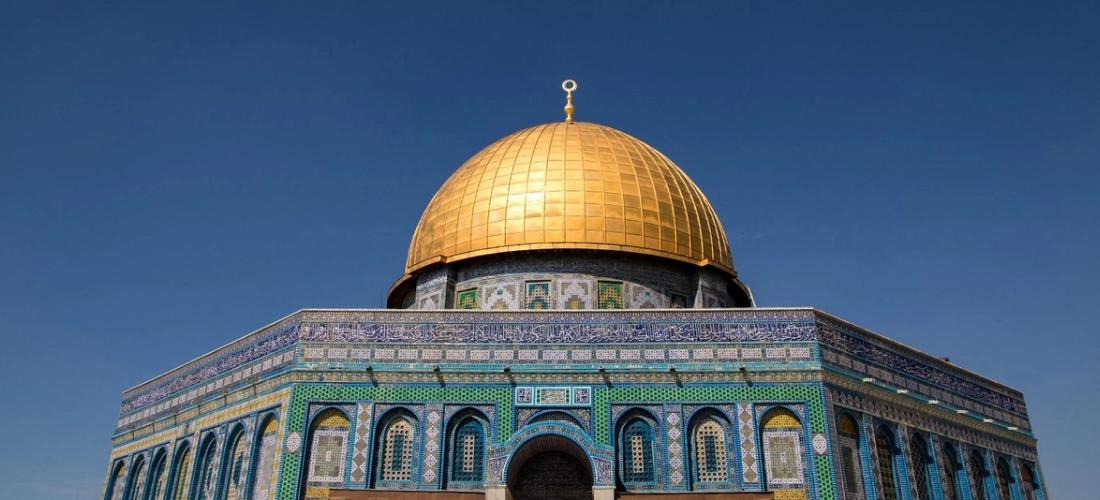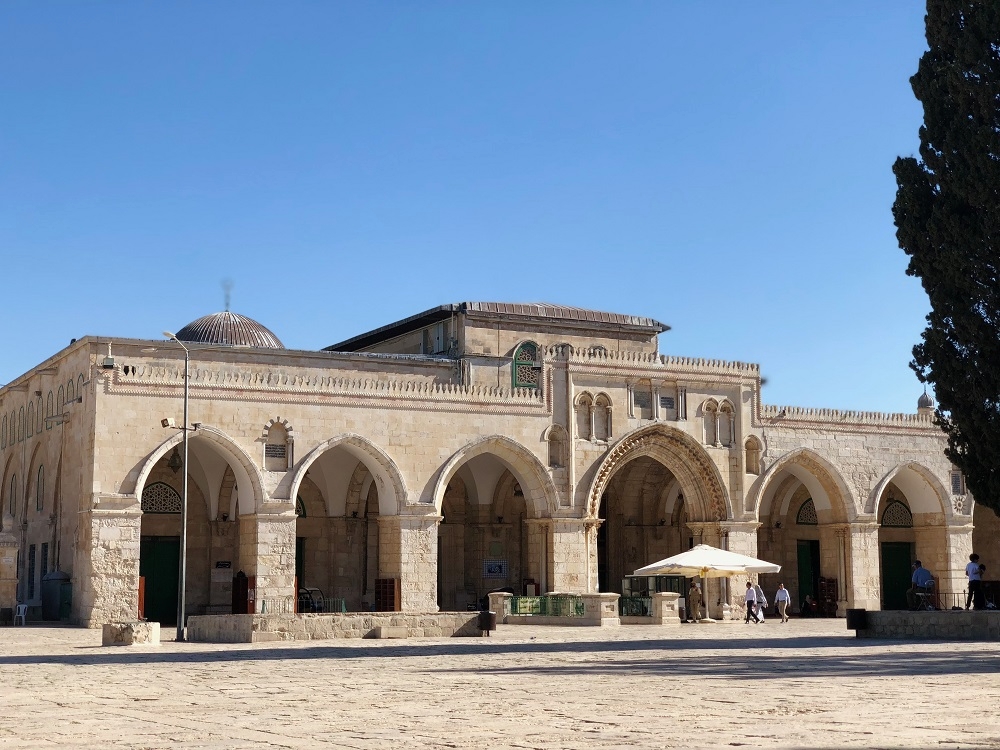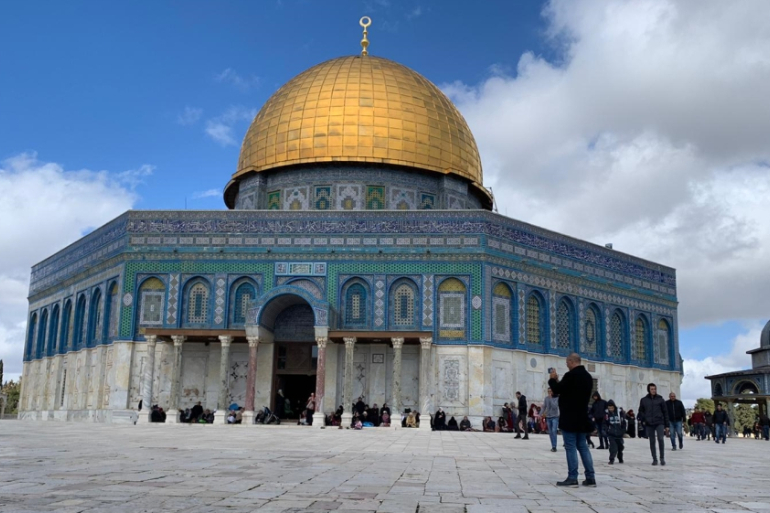The Miraculous Journey of Isra/Mi'raj – Celebrating Salah, Divine Revelation & the Significance of Friday
Faith
|
Jan 31, 2024
|
5 MIN READ

The Dome of the Rock in Jerusalem, from which the Prophet's ascension is believed to have begun. Image source: Pexels; photo by Becca Siegel
In the tapestry of Islamic tradition, the journey of Isra and Mi'raj stands as a remarkable testament to the profound connection between the earthly and the divine. This celestial journey, undertaken by the Prophet Muhammad (saw), not only marked a moment of extraordinary revelation but also intertwined itself with the significance of Friday, a day of special blessings in Islam.
As we continue our focus on salah and prayer, this exploration delves into the miraculous journey of Isra and Mi'raj, shedding light on its divine revelations and the pivotal role Friday plays in the hearts of Muslims, weaving together a narrative of spiritual transcendence and communal devotion.
Isra/Mi'raj: A Divine Journey
Isra and Mi'raj, a significant event in Islamic tradition, holds a special place in the hearts of Muslims worldwide. This miraculous journey is believed to have occurred in the month of Rajab a year before the Prophet’s migration from Makkah to Madinah, during the night when the Prophet Muhammad (peace be upon him) was transported from Mecca to Jerusalem and ascended (likely from the site of the Dome of the Rock) through the heavens. This awe-inspiring event is mentioned in the Quran
Glory be to the One Who took His servant ˹Muḥammad˺ by night from the Sacred Mosque to the Farthest Mosque whose surroundings We have blessed, so that We may show him some of Our signs. Indeed, He alone is the All-Hearing, All-Seeing.
Surah Al-Isra 23:1
Albeit briefly mentioned, this verse provides a foundational account of the journey. Furthermore, in the hadiths, particularly those found in Sahih Bukhari and Sahih Muslim, we find more detailed and vivid descriptions of this celestial voyage.

Al Aqsa mosque in Jerusalem; photo courtesy of HH's Danah Shuli
According to these hadiths, the Isra and Mi'raj involved a physical journey and a spiritual ascent against the backdrop of intense pain and hardship for our beloved Prophet. In the company of the archangel Jibreel, Prophet Muhammad (saw) met and conversed with previous prophets such as Adam, Abraham (Ibrahim), Moses (Musa) and Jesus (Isa) (as) during his night journey. This extraordinary gathering of prophets symbolizes the unity of the Abrahamic faiths and serves as a reminder of the interconnectedness of Allah’s messengers throughout history.
The pinnacle of the Isra and Mi'raj was the Prophet's ascension through the heavens, where he encountered celestial wonders and experienced a closeness to the Divine that is beyond human comprehension. This journey reaffirms the Prophet's unique and exalted status in Islam and serves as a source of inspiration and spiritual reflection for Muslims worldwide. Isra and Mi'raj, therefore, hold a central place in Islamic spirituality and the rich tapestry of Islamic tradition, offering believers a glimpse into the extraordinary and the profound.
The Sending Down of Salah/Prayer
One of the pivotal moments during the Isra and Mi'raj was when Allah (S), in His infinite wisdom and mercy, prescribed the five daily prayers as an obligation for the Muslim Ummah. Whereas Allah (S) initially made 50 prayers obligatory for Muslims, with the intervention of Musa (as), this number was brought down to five. This divine commandment holds immense significance in Islamic faith and practice, as salah is a fundamental pillar of a Muslim's daily life. The importance of these five regular prayers is emphasized in the hadiths and Islamic tradition and is expressed in the Quran.
Allah (S) specifically addresses the significance of establishing regular prayers. He states.
Certainly, the believers have succeeded: They who are, during their prayer, humbly submissive.
Surah Al-Mu’minun 23:1-2

The Dome of the Rock in Jerusalem, from which Muslims believe the Prophet Muhammad likely ascended to the heavens. Image source: Pexels.
These verses highlight the crucial role of prayer in a believer's life. It signifies that success in this world and the Hereafter is intrinsically tied to one's devotion and submission during prayer.
Isra and Mi'raj, therefore, not only provided the Prophet Muhammad (saw) with a miraculous journey through the heavens but also bestowed upon the Muslim Ummah the divine gift of the five daily prayers. These fard prayers give us the immense opportunity to connect with the Creator, seek forgiveness, guidance and strength, and reinforces the bond between the individual and their faith. It is a reminder that prayer remains a steadfast and essential practice for Muslims, ensuring spiritual growth and closeness to Allah (S) amid life's challenges and distractions.
The Significance of Friday
Friday, known as "Jumu'ah" in Arabic, holds a unique and cherished status in Islam as a blessed day. Among the days of the week, Friday is considered the most special, and it carries immense significance for Muslims worldwide. Allah (S) mentions the importance of Friday:
O you who have believed, when [the] call is proclaimed for the prayer on Friday, proceed to Allah's remembrance and leave trade. That is better for you if you only knew.
Surah Al-Jumu’ah 62:9
This verse underscores the significance of attending the Friday congregational prayer and prioritizing the remembrance of Allah (S) over worldly affairs on this blessed day.
In addition to the Quranic guidance, hadiths also emphasize the importance of Jumu'ah and the Friday congregational prayer. The Prophet Muhammad (saw) said:
The best day on which the sun has risen is Friday; on it, Adam was created, on it he was made to enter Paradise, on it he was expelled from it, and the Last Hour will take place on no other day than Friday.
Sahih Muslim, 1857
This hadith highlights the exceptional nature of Friday as a day of significant historical events and a day on which the Last Hour will occur.
Furthermore, Jumu'ah serves as a gathering day and communal worship for Muslims. It is a time when the Muslim community comes together at the mosque to offer the Friday prayer, listen to the sermon (khutbah), and strengthen the bonds of brotherhood and sisterhood. The congregational prayer on Friday is seen as a means of seeking Allah's (S) blessings, forgiveness and guidance, making it a spiritually enriching and rewarding experience for believers.

Image source: Pexels
In essence, Friday is not just another day of the week for Muslims; it is a day of spiritual rejuvenation and communal unity, a reminder of the importance of faith in our lives.
The journey of Isra and Mi'raj and the inherent significance of Friday exemplify the multifaceted nature of Islamic faith and practice. The celestial journey of the Prophet Muhammad (saw) serves as a beacon of spiritual enlightenment and a testament to the profound connection between the earthly and the divine.
And while the word “obligatory,” or fard, is used to describe our five daily prayers, consider how much of a gift salah is to us as Muslims in how it gives us the chance to slow down, converse with Allah (S) and worship Him. Simultaneously, Friday, the day of gathering and communal worship, stands as a reminder of the importance of unity and devotion in the Muslim Ummah.
Together, these elements form a harmonious faith narrative, guiding believers towards a deeper connection with Allah (S) and a greater sense of community, enriching the tapestry of Islamic spirituality and tradition.
Subscribe to be the first to know about new product releases, styling ideas and more.
What products are you interested in?

